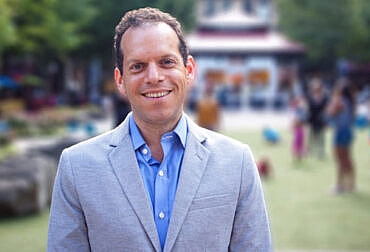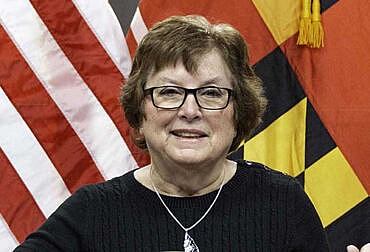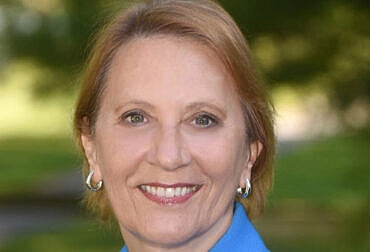Eric Bond is a journalist, radio show host (WOWD 94.3) and the former publisher of the Takoma Voice. He discussed with Montgomery County Executive Marc Elrich about issues facing the County. This is the first of a 3-part transcript of the interview.
Policing in Montgomery County
Eric Bond: What is your view about the idea of de-funding of the police?
Marc Elrich: The first thing I’ll say is, this is not like the military where I’ve got a bomber program to cancel. Encounters in which the police, you know, harass young minority kids—that’s not something you can cancel and say, let me get rid of that. I think that we’ve offloaded every social problem in the world on the police, whether it’s drugs, alcohol, homelessness, mental health–you know, these are the guys who get called in to deal with it. They should not be the ones that get called in, or if they do get called, it should be in conjunction with others.
At the end of the day, I don’t know whether I’m going to save any money if I bring in mental health teams into the department, because I don’t have to respond with as many officers. Because something like this might happen once a day or less, so I don’t know if it’s going to result in less money being spent. My view is that whatever it takes to fix these problems, we should do it–I don’t care where the money comes from. If there’s not enough savings in the police department to have trained professionals handling homelessness issues and mental health issues, then we’re going to have to find the money someplace else. So I don’t look at this situation as: I’m going to defund this and fund that.
On School Resource Officers (SROs)
Marc Elrich: The one thing that we’ve looked at [in the policing budget] are the SROs. I was the only person on the Council who used to question the SRO program, because, to me, it is heartbreaking. We all went to school without police in our schools. The schools have unarmed security people, but they are security people who are supposed to deal with unruly people and the fact that they can’t do it– such that the schools feel the need to have policemen in the building–is just a sad commentary on how we’ve allowed, you know, behaviors to deteriorate. Nobody should be doing stuff in a school that requires a police officer, and nobody should be picking fights, having fights that are brutal enough, large enough that only the police can break them up. And to me, it’s a sad, sad commentary on where we are.
I am really interested in trying to figure out how we fix THAT, rather than to hope the police can deal with all of it. The law does not require us to have SROs. The law requires us to have a plan for how we will respond [to a school emergency]. And the SRO, I think became a convenient way to have police deal with the other problems. I would like to rearrange police beats, make the schools a part of people’s beats, expect them to check in, in the morning, as school is letting out, or maybe check in at lunchtime, but not need to be there. What the schools really need are more social workers and psychologists in the schools. And, you know, we are understaffed by national norms. We fall way, way down in the terms of the support services we put in schools. So, you know, if it was up to me, I’d put more money into the support services, less money into the police in schools. But you know, we’ll save everything we can and we’ll put money it into the things we know we should be doing.
Covid-19 and Racial Equity
Eric Bond: COVID has thrown racial inequities into much sharper relief in Montgomery County. And I’m wondering what you see as ways to bridge those inequities right now.
Marc Elrich:We’ve expanded services [food, testing, housing support] and we continue to serve people who otherwise wouldn’t get services. And, in doing that, we discovered just how little our reach into some of these communities is, even with all the traditional ways of reaching out, reliance on social media and everything else, we still weren’t getting into those communities. So we wound up doing health care delivery through the African-American health initiative and the Latino initiative and letting those groups bring the services deeper into the community. We are relying more on community-based organizations and we’ve set up now eight hubs in the County for distributing services.
As we’re looking at this, I am thinking this is a model we probably ought to move to. We ought to not have everybody have to come to Hungerford Drive to get a service. We need to put more of the services close to where people live so they can get there easier, so that they are not faced with “How many buses can I endure riding and how many hours in the day can I give up to get to Hungerford Drive?” So that’s one of the things that, that we’re looking at.
Eric Bond: Longer term, what’s in the works to promote racial equity in Montgomery County?
Marc Elrich: I’ve got to say, people are probably going to raise questions about where we decide to spend money and particularly on capital projects. You know, you would not be surprised where capital projects go and where they don’t go. And I think, if racial equity is going to play a role in thay, then we should not just responding to the noisiest wheel. It has to be the fairest distribution of resources.
Eric Bond: Would you need to have the council on board for changing capital projects decisions?
Marc Elrich: Yes. So we’ll see, we’ll see, because they’ve got some really big projects that are all targeted in one area that dwarfs what we’re spending in other places. Longer-term, big picture…. I’ve had conversations with folks in the healthcare system, including the hospitals, about what we need to do going forward, because they’ve seen it [income and racial disparity] in their emergency rooms. They’re well aware who are in their beds and who isn’t in their beds and what the effect of COVID has been. And I think everybody understands–we’ve got to have a more robust health system and it would be nice if the country would do it. And again, maybe this is something that happens with Democrats coming in [to power], and you get a real healthcare system– something frankly, better than Obamacare, because, the ACA does not nearly deal with the problems that are out there. Too many people are at the low end of the income spectrum who can’t afford to deal with it. So I’m hoping we get real health care, because I was really encouraged by my conversations with folks in the hospitals about how the pandemic has made it really painfully clear what happens when people don’t get access to healthcare and it has consequences. So that could be something down the road that’s beneficial to us.
On Racial Equity and Housing
Marc Elrich: We’ve been trying on the housing stuff we do to require that housing provide more affordability than it has in the past. People who are living in moderately priced dwelling units (MPDUs), are a fraction of the number of people who can’t afford to live in Montgomery County. You need to know that they [MPDUs] serve people who earn around 70% of area median income (AMI). We have got tens of thousands of people who earn 30, 40, 50% of area median income. None of our programs have historically dealt with them; it was a smattering of programs here and there. We’re trying to get more from the deals we make to serve people at the bottom of the economic spectrum, because this gap is so large. And the thing is, you’ve got more MPDU units than people who need MPDU unites, so the units are often occupied by people who are making far less than 80% of area median income. They’re being occupied by people paying 50 and 60% of their income to live in those units.
So if people felt there was a need to create more housing for people at around 80% of AMI, the actual most efficient way to do it would be provide housing that’s affordable to people at 30 and 40% of AMI because it would free up those MPDU units. It would free those people from paying 50 to 60% of their income to live in homes they can’t really afford. If I just build more market rate units or more high-priced MPDU units, I still have this phenomena of tens of thousands of people paying 60% of their income for rent, which they can’t afford. So we’re trying to have that discussion. You know, there are council members who believe that you just build more housing and then you get more affordable housing and it’s like, that’s BS. You know, it is like a market trope. It has no bearing in reality. When Montgomery County went through its enormous housing, boom under Duncan, the affordability crisis was already well in place, and the number of affordable units were dwindling.
There was no guarantee that building high end housing lowers prices for other units. That’s not the way the world works. And so, yes, there are apartments in Bethesda that are older, that won’t get the price of a brand new apartment, but it doesn’t mean they’re going to drop to $1 600 or $1,200 a month. They are just going to serve people who can’t afford $3,000 a month or $2,500 a month. So we think if you need to deal with the housing crisis, you’ve actually have to build housing for targeted populations and get them out of the overpriced housing. And then you will free up units that could be affordable to people in need of them who were being out competed by the volume of demand and it shortens the supply for this one batch of housing.











